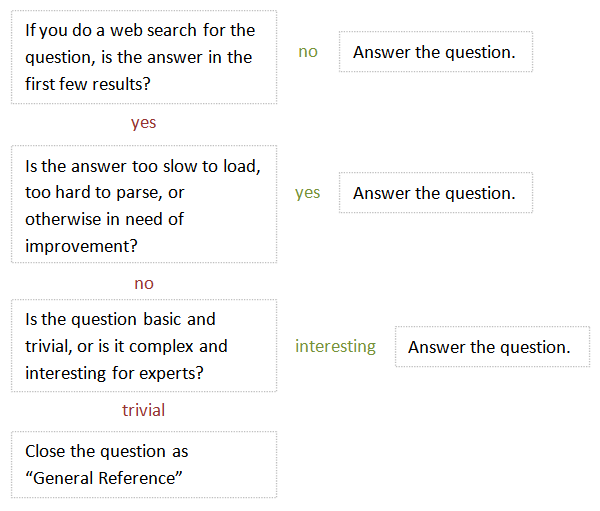There is a certain amount of questions that are absolutely trivial in nature: How to format a date, how to concatenate a string, et cetera. Questions that could be solved by taking a look into the manual.
Random examples from the tags I frequent:
- php timestamp function needed
- https://stackoverflow.com/questions/6613890/how-to-add-string-to-the-beginning-of-a-string
- How can I edit a binary image in PHP?
- Does PHP have an inverse of the date() function (other than strtotime())?
- Is goto supported in PHP 5.2.8?
- https://stackoverflow.com/questions/5880301/variable-string
- PHP - make all caps?
- Adding a background image to a <div> element
- Is it possible to get UNIX time from such date 2011-02-27 02:04:46?
- Time string to timestamp
- How do I create a PHP page which can accept file uploads?
What those OPs need is a link to the right manual, which we should give them. But the question serves no purpose. They don't even have a use by being searchable, because any sane search query would lead to the actual manual as the first hit.
Jeff discusses the possibility of introducing a new close reason for this over at Scifi.stackexchange.com. According to Robert's suggestion there, it could go like this:
general reference: this question is too basic; the answer is indexed in any number of general internet reference sources designed specifically to find that type of information.
Please please implement this.
Add a field (like the "enter duplicate ID here" popup) for users to suggest the correct manual link:

The suggested links would then be shown in a block in the top section of the question, like duplicate links.
Also, the amount of reputation earnable from these trivial questions is appalling. I'm sure a great portion of most high-rep users' points (including mine) is from answering "what was that function for replacing a string again?" type questions. This dilutes the value of reputation as a measure of true expertise a great deal.
I would suggest that answers to questions that get closed as "general reference" are made community wiki retroactively, taking away any reputation earned.


Google itis specifically banned on SE.Do we really want to spoon-feed (or even encourage in any way) users so lazy they can’t find obvious Wikipedia pages? Or do even the most basic research before asking?